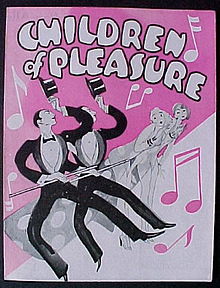- Children of Pleasure
-
Children of Pleasure 
PosterDirected by Harry Beaumont Written by Richard Schayer
Crane WilburStarring Lawrence Gray
Wynne GibsonCinematography Percy Hilburn
Technicolor sequencesEditing by Blanche Sewell Distributed by Metro-Goldwyn-Mayer Release date(s) April 26, 1930 Running time 70 minutes Country United States Language Sound All-Talking Children of Pleasure is a 1930 American MGM musical comedy film directed by Harry Beaumont originally released with Technicolor sequences. It was adapted from Crane Wilbur's stage success of 1929 The Song Writer.
Contents
Plot
An acclaimed singer Terry falls in love with a socialite girl Carlie who is just playing around. He doesn't realize that his girl-Friday is the one he really loves until it is almost too late. Although he is awestruck by high society, he overhears the girl's admission that she is stringing him along in the nick of time avoid marriage.
The film is played against a theatrical backdrop, and contains many songs and production numbers.
Cast
- Lawrence Gray ... Danny Regan
- Wynne Gibson ... Emma 'Em' Gray
- Judith Wood ... Patricia 'Pat' Thayer (as Helen Johnson)
- Kenneth Thomson ... Rod Peck (as Kenneth Thompson)
- Lee Kohlmar ... Bernie (as Lee Kolmar)
- May Boley ... Fanny Kaye
- Benny Rubin ... Andy Little
- Jack Benny ... Himself, Cameo Appearance (uncredited)
- Sidney Bracey ... Miles (butler) (uncredited)
- Mary Carlisle ... Secretary (uncredited)
- Carrie Daumery ... Dowager (uncredited)
- Ann Dvorak ... Chorus girl (uncredited)
- Jay Eaton ... Eddie Brown (uncredited)
Production
The movie was originally premiered and released with Technicolor sequences in the summer of 1930.[1] One reviewer noted that "the revue scenes filmed in Technicolor being particularly lavish." [2] These color sequences were later replaced with a black-and-white version that had been filmed simultaneously because the backlash against musicals (which occurred in the autumn of 1930) made the expense of printing color prints superfluous and frivolous. Only this black-and-white general release version currently exists. The same fate was shared by another of MGM's major musicals, Cecil B. DeMille's Madam Satan which was released during the same time period. A segment of one of the Technicolor sequences survives in an MGM short subject in color titled Roast Beef and Movies (1934).
Soundtrack
Lawrence Gray recorded two of his songs from the picture for Brunswick Records. His rendition of the songs Leave It That Way and The Whole Darned Thing's For You were released on Brunswick's popular ten inch series on record number 4775.
See also
- List of American films of 1930
- List of early color feature films
References
- ^ Several film reviewers refer to these Technicolor sequences. e.g., Berkeley Daily Gazette - Jul 10, 1930 - Page 14 http://news.google.com/newspapers?id=JjsyAAAAIBAJ&sjid=PuQFAAAAIBAJ&pg=4783,737346&dq=children-of-pleasure&hl=en ; Times Daily - May 28, 1930 - Page 20 http://news.google.com/newspapers?id=riosAAAAIBAJ&sjid=G7oEAAAAIBAJ&pg=4547,7005754&dq=children-of-pleasure+technicolor&hl=en
- ^ The Hartford Courant, Jun 8, 1930, Page D3
External links
- Children of Pleasure at the Internet Movie Database
- Children of Pleasure at AllRovi
Films directed by Harry Beaumont 1910s Brown of Harvard (1918)1920s The Gold Diggers (1923) · Main Street (1923) · Beau Brummel (1924) · Our Dancing Daughters (1928) · The Broadway Melody (1929) · Speedway (1929)1930s Great Day (1930) · Lord Byron of Broadway (1930) · Children of Pleasure (1930) · Those Three French Girls (1930) · Dance, Fools, Dance (1931) · Laughing Sinners (1931) · Are You Listening (1932) · Faithless (1932) · When Ladies Meet (1933) · When's Your Birthday? (1937)1940s The Show-Off (1946) · Alias a Gentleman (1948)Categories:- 1930 films
- 1930s musical films
- Films made before the MPAA Production Code
- Films shot in Technicolor
- 1930s romantic comedy films
- American musical comedy films
- American romantic comedy films
- American romantic musical films
- Black-and-white films
- English-language films
- Films directed by Harry Beaumont
- Metro-Goldwyn-Mayer films
Wikimedia Foundation. 2010.
